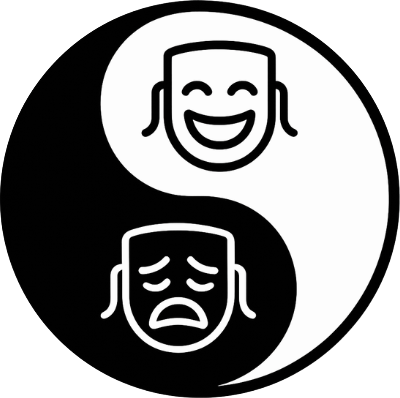The 5 Pillars of Actor Training

"Clarity and simplicity are the antidotes to complexity and uncertainty." ~ General George Casey
The life of an actor is complex and uncertain enough. Complexity and uncertainty are almost preappointed companions on the path. We're therefore wise to clarify and simplify as many elements as we can along the way, because, let's face it, there aren't a tonne.
For 99.99% of our population, an actor's day-to-day training falls squarely into the "complex and uncertain" category. What should we be doing? How much is enough? Where do we even begin? If we have friends who are athletes or musicians or the like, we may look at their clear, concise routines with genuine envy. If only it were that straightforward, right? If only there was a framework for us.
Since 2017, we've been dissecting both the actor's experience and peak-performance training. And, as a result, we have a solution to offer. We're constantly refining this system and will continue to update this page to reflect these improvements, but we at least want to share what we're currently rolling with. Our current blueprint for actor training and empowerment.
It starts with The Actor's Training Menu. We introduced this concept in a previous post, but essentially:
- A Training Menu's purpose is to systemise success, making our goals actionable and attainable.
- A Training Menu is completely customised to and for us and our specific goal.
- A Training Menu is both tremendously effective and unexpectedly simple.
Over the course of these past four years, we've identified five overarching areas of actor training – five domains that determine whether we're truly operating as a well-rounded, goal-smashing badass. We call these the Five Pillars: Skills, Marketing, Immersion, Creation and Team. Alas, the acronym isn’t super clickbait-y (though who knows, maybe SMICT will stick), but fortunately they're all pretty self-explanatory.
So, if we think of our Training Menu like a high school timetable in structure, the "classes" are a collection of goal-directed tasks from each of the Five Pillars.
Below, we break down each of the Five Pillars and list a couple of examples of tasks that fall under each (as well as our recommendation for how many "classes" per week). Of course, this will depend entirely on our specific goal at the time, and we'll likely have to make some tweaks and changes as we go. Rest easy amigos, this is almost inevitable. But we can't optimise what doesn't exist.
Welcome to the Five Pillars.
Backed by science; built for the stage and screen.
👊 Actors:
Get evidence-informed insights and strategies to support your performance and well-being. Join the Dojo e-newsletter tribe and make thriving your reality.
🧭 Drama schools & Production companies:
Bring pioneering, research-backed coaching into your classroom or rehearsal room. Let’s talk about supporting your actors to perform at their peak – and stay well in the process.
Skills
Skills keep us actors "match fit" – ready to perform at our best at any given moment. This is of particular importance, as no doubt we've all experienced the: "Hi, you have an eight-page audition in less than 24 hours" scenario.
Skills are instrument-related, so in this instance, largely concerning our body and voice.
Some Skills examples include:
- Yoga
- Dance
- Stage combat
- Singing
- Accents
- Acting technique
When crafting our Training Menu for a new goal, three Skills sessions weekly is generally a good place to start.
Marketing
Marketing keeps us actors "top of mind" – seemingly ever-present in the minds of our industry's decision-makers.
The Marketing Pillar covers all the connecting and networking we must practice to create and foster strong professional relationships. This typically isn't the most loved part of an actor's existence, but at least with a system in place we gain a sense of intention and confidence.
Some Marketing examples include:
- Headshots
- CVs
- Showreels
- Social media feeds
- Online casting platforms
- "Cold" or "warm" emails to decision-makers
Two or three Marketing sessions per week tends to be a nice fit.
Immersion
Immersion keeps us actors in the know – both about the current industry landscape, as well as the historic trends and classics.
This may sound suspiciously too good to be true (internal dialogue: "WE'RE GETTING OFFICIAL PERMISSION TO BINGE-WATCH TV?!") and sure, it's not the worst assignment ever. That said, this content consumption is to be done actively, with our goal in mind.
Some Immersion examples include:
- Watching film/TV/theatre
- Playing video games
- Listening to audiobooks
- Reading industry magazines
- Studying talk show interviews
Again, we'd recommend starting with two or three Immersion sessions per week and adjusting from there.
Creation
Creation keeps us actors creatively contributing. Regardless of how we may go about doing so, this is hugely important for both the world and our souls.
And, as we've said at least 18 gazillion times (apologies to the homies who've heard this from day one), it's no longer enough to simply be a talented actor. Yes, there are absolutely exceptions to this rule, but for the majority, creating independently is becoming more and more of a necessity.
Creation differs slightly from the preceding Pillars as it may not necessarily directly link to us achieving our goal. It can do – and we encourage trying something that might, even if only as an experiment – but it's also allowed to be a seemingly separate entity entirely.
Some Creation examples include:
- Self-taping
- Writing
- Crewing
- Making music
- Taking photos
For Creation, one or two sessions weekly is usually nice.
Team
Team keeps us actors the metaphorical "big fish" in our reps' pool, or poised to find the perfect rep if we're currently on the hunt.
Team is probably the least intuitive of the Five Pillars, but as our industry is one so fundamentally built on trust and strong relationships, will always prove disproportionately advantageous.
Some Team examples include:
- Updating our reps (with new headshots, tape, connections etc.)
- Reviewing strategy with our reps
- Researching prospective agents, managers and/or publicists
- Contacting prospective agents, managers and/or publicists
- Researching potential options for a personal coach or mentor
Team tasks are likely to only need one session weekly – perhaps even fortnightly – depending on our circumstances at the time.
Et voilà! You've now earned your yellow belt in the way of The Five Pillars.

Behavioural Scientist, Steve Maraboli, says: "It's a lack of clarity that creates chaos and frustration. Those emotions are poison to any living goal."
For those of us ready to stop unconsciously poisoning our goals, here's a remedy. We look forward to seeing you out on the path.
Love what you’re reading? Help us keep it flowing. Donations support the research, writing, and free sharing of evidence-informed tools for actor performance and well-being. Every dollar fuels our mission to make thriving a reality for actors everywhere 🔥
Cite us!
IG: @theactorsdojo
APA 7: Norrish, T. (2021, September 28). The 5 pillars of actor training. The Actor’s Dojo. https://www.dojoactors.com/the-5-pillars/
